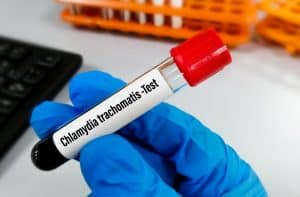The potential impact of an undetected sexually transmitted chlamydial infection on men’s fertility has been identified in a study conducted by the Queensland University of Technology (QUT), which for the first time detected chlamydia in testicular tissue biopsies from infertile men whose infertility had no identified cause.
Researchers also found specific antibodies to the responsible bacterium, Chlamydia trachomatis, in the blood of 12 of 18 donors of the fresh testicle biopsies, suggesting that the men had been exposed to the bacterium – but none of the men reported symptoms of infection or illness Chlamydia or another sexually transmitted infection (STI) was previously diagnosed.
Chlamydia Infections in Men
The study provided some key findings.
- Men whose tissue was tested were moderately to severely infertile, produced no or few sperm, and the majority had no clear cause for their infertility.
- Chlamydia was found in 45.3 per cent of solid testicular biopsies (43 of 95 men) taken by Monash Health’s anatomical pathology department. All men in this group had no defined cause of infertility.
- Chlamydia was also found in 16.7 per cent of fresh testicular biopsies (3 of 18 men) taken as part of sperm retrieval from patients by Monash IVF Group and Queensland Fertility Group. These three men and another ten in the group had no identified cause for their infertility.
- Chlamydia trachomatis-specific antibodies were found in the serum of 12 of the 18 men who provided fresh biopsies (66.7 percent), suggesting that the men had been exposed to the bacteria – but all were asymptomatic and reported that they had it no STIs had been diagnosed.
Lead researcher Ken Beagley, QUT Professor of Immunology from the Institute of Health and Biomedical Innovation, explained that despite similar infection rates, chlamydia infections in men have not been studied as widely as in women.
Chlamydia infection has been linked to infertility in women, but much less is known about its impact on male infertility, particularly when men have no symptoms, which is estimated to occur in about 50 percent of cases. When people don’t have symptoms, they can unknowingly pass the infection on to sexual partners.
Interference With Normal Sperm Development
This is the first reported evidence of chlamydia infection in human testicular tissue, and while it cannot be said that chlamydia was the cause of the men’s infertility, it is a significant finding, according to the researchers, and shows a high rate of previously undetected chlamydia -Infections, and the possible role of infection in preventing sperm development in the testes. The group’s animal studies support these findings in humans. These studies show that chlamydial infection in male mice results in chronic infection of the testes, which significantly impairs normal sperm development.
The researchers believe future studies with male patients should examine how chlamydia infection could damage the male reproductive system and contribute to infertility. Professor Beagley explained that testing testicular tissue could also be a useful screening and diagnostic tool for doctors in the future, helping to inform them of treatments to improve reproductive outcomes.
Typically, the diagnosis of chlamydia infection is made using a urine sample, but in men this may not always reveal the infection. In the study, two of the three patients whose fresh biopsies were positive for chlamydia were negative for the bacteria in their urine. For the third patient, they were unable to obtain a urine result. This indicates that the infection may not enter the urinary system or may only enter the urinary system intermittently. Monash IVF Group male fertility specialist and co-author of the study, Professor Robert McLachlan, noted that for the majority of men with poor sperm quality, there was no identifiable cause.
Certain causes are known, such as the toxic effects of chemotherapy drugs, but for many men there is nothing notable in their sexual or medical history that could explain their fertility problems. Understanding a cause is the first step to doing something about it. Chlamydia infection in men is something that needs further study, according to the researchers. If it is a potential cause or aggravating factor, the focus is on how treatment can repair damage and improve sperm count, and how to prevent infection.






